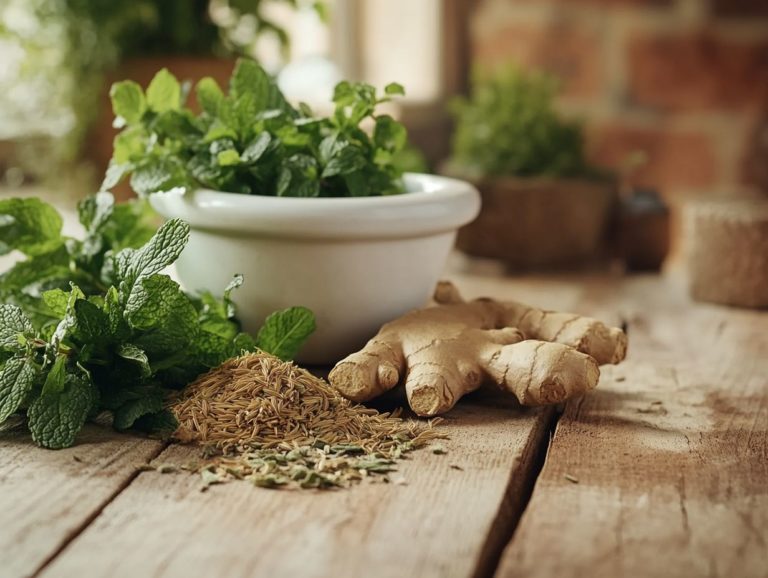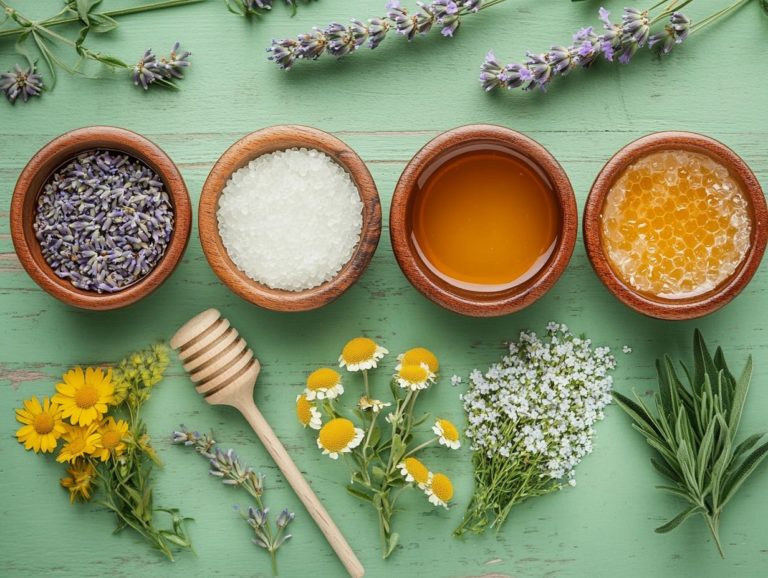Natural Remedies for Headaches Using Herbs
Headaches can be a common yet disruptive part of life, often leaving us searching for effective relief. Understanding the different types of headaches and their causes is essential to finding the right remedy.
In this article, we’ll explore herbal remedies, highlighting commonly used herbs and their benefits for alleviating headache symptoms. You’ll learn how to prepare and use these herbs, discover powerful combinations for maximum effect, and uncover strategies to prevent headaches. Say goodbye to discomfort and hello to natural solutions that might change the way you manage headaches.
Contents
- Key Takeaways:
- Understanding Headaches
- Herbs for Headache Relief
- How to Use Herbs for Headache Relief
- Conclusion
- Combining Herbs with Other Remedies
- Preventing Headaches with Herbs
- Frequently Asked Questions
- What are natural remedies for headaches using herbs?
- What are the benefits of using natural remedies for headaches?
- Which herbs are commonly used for headache relief?
- How do these herbs help with headaches?
- Are there any risks or side effects associated with using herbs for headaches?
- Can natural remedies for headaches using herbs be used alongside other treatments?
Key Takeaways:

- Incorporating herbs into your routine can be a natural and effective way to relieve headaches.
- Understanding the different types of headaches and their causes helps you choose the right herbs for relief.
- Herbs can be used in various forms to prevent and treat headaches without harsh side effects.
Understanding Headaches
Understanding headaches is essential for effective pain management. These health issues can vary widely, from mild discomfort to severe migraines that can make it hard to function.
Headaches can stem from many causes, including stress, hormonal changes, or underlying health conditions. They can present themselves in various forms, such as tension headaches or cluster headaches.
By learning about the types of headaches and their triggers, you can explore holistic approaches like herbal medicine and traditional practices that may help relieve pain and enhance your overall wellness.
Types of Headaches and Causes
Headaches can be categorized into several types. Migraines and tension headaches are among the most common, each with distinct causes and symptoms that require tailored approaches for relief.
Tension headaches often arise from stress, poor posture, or muscle strain, leading to a persistent dull ache that affects daily activities.
In contrast, migraines typically exhibit more severe symptoms, including intense throbbing pain, nausea, and sensitivity to light and sound. They are often triggered by hormonal changes or certain foods.
Cluster headaches are characterized by extreme pain concentrated around one eye, occurring in cyclical patterns.
These varying types can impact not just physical well-being but also emotional health, leading to anxiety and frustration for those who suffer from them.
Herbs for Headache Relief
Herbal medicine offers a range of natural remedies that can effectively alleviate headaches. By using various herbs known for their soothing properties, you can experience pain relief without the unwanted side effects often linked to conventional medication.
Commonly Used Herbs and Their Benefits
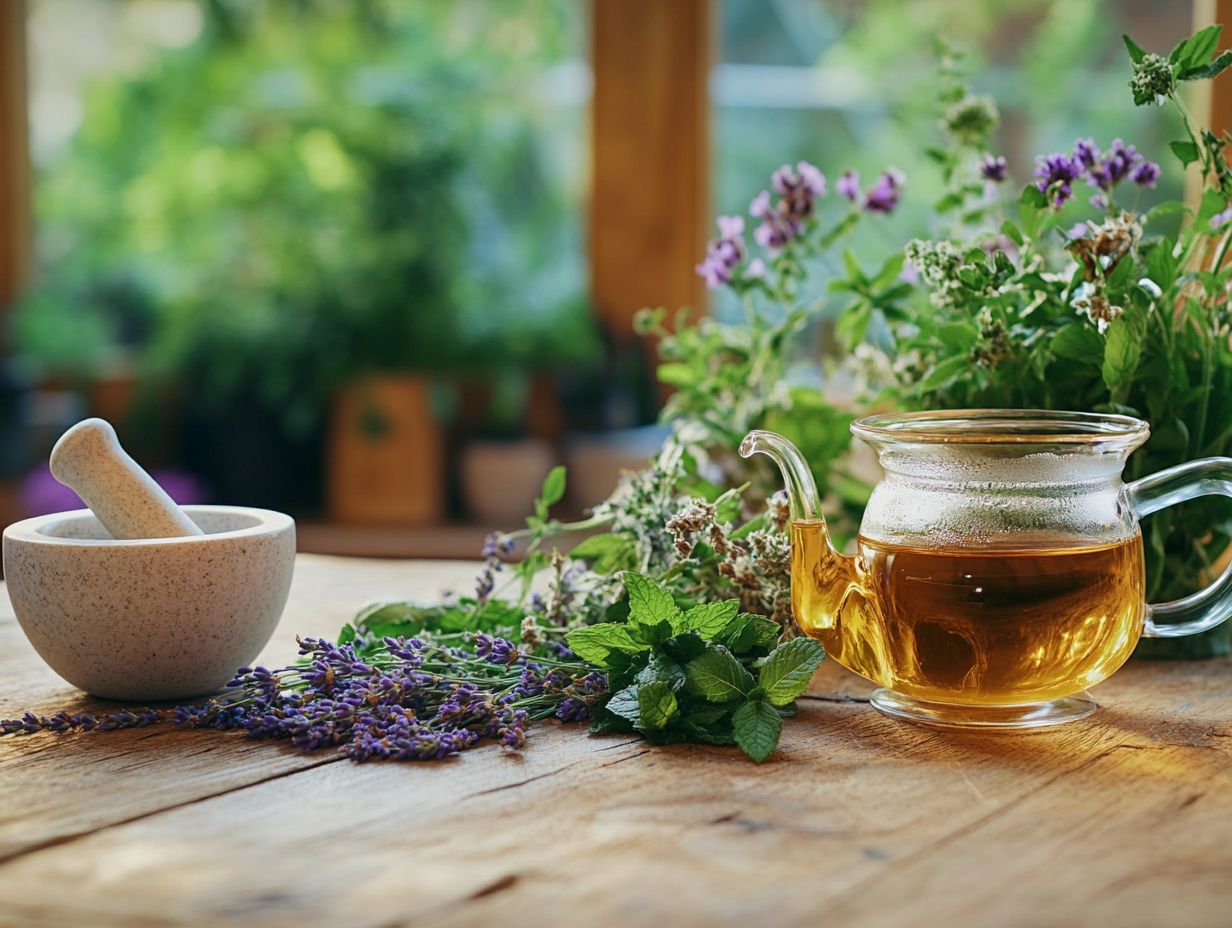
Commonly used herbs include Feverfew, Butterbur, Ginger Root, and Lemon Balm. These herbs are recognized for their ability to ease headache symptoms and promote overall wellness.
Feverfew is often praised for its potential to inhibit the release of compounds that trigger migraines. Butterbur has been shown in studies to reduce the frequency of migraine attacks.
Ginger Root has anti-inflammatory properties that can help alleviate nausea associated with headaches, while Lemon Balm is soothing and can reduce tension headaches.
Herbal remedies provide a holistic approach to headache treatment; both traditional practices and modern studies confirm their effectiveness in supporting a pain-free lifestyle. For those interested in natural solutions, 10 easy DIY herbal remedies for headaches can be a great option.
How to Use Herbs for Headache Relief
To harness the power of herbal treatments for headache relief, it’s vital to understand the preparation methods and appropriate dosages. This knowledge allows you to maximize health benefits while minimizing any potential side effects, ensuring a safe and effective experience.
Conclusion
In summary, understanding headaches and exploring herbal remedies can offer you natural and effective relief. Consider trying some of the herbs mentioned, and consult a healthcare provider for personalized advice. Embrace these natural solutions and take a step towards managing your headaches effectively.
Methods of Preparation and Dosage
Common methods of preparation for herbal remedies include brewing teas, creating tinctures, or using powdered herbs. Appropriate dosage is crucial for effective headache relief.
For instance, brewing teas extracts beneficial properties from herbs like peppermint or chamomile. A typical dosage consists of one teaspoon of dried herb per cup of boiling water, steeped for about 10 minutes.
Tinctures, which are concentrated liquid extracts, usually require a lower dosage, around 2-3 dropperfuls taken several times a day, depending on the herb, such as feverfew or valerian root.
Alternatively, powdered herbs can be encapsulated or mixed into foods. A common dose ranges from 300 to 600 mg for headache relief.
Each method has unique advantages. Knowing how to use these herbs is key to managing headaches.
Combining Herbs with Other Remedies
Integrating herbal remedies with complementary methods like acupuncture and stress relief techniques can significantly enhance your pain relief efforts and promote overall wellness.
This all-around strategy helps you tackle headaches effectively, addressing both the symptoms and underlying causes with greater efficacy.
Effective Combinations for Headache Relief
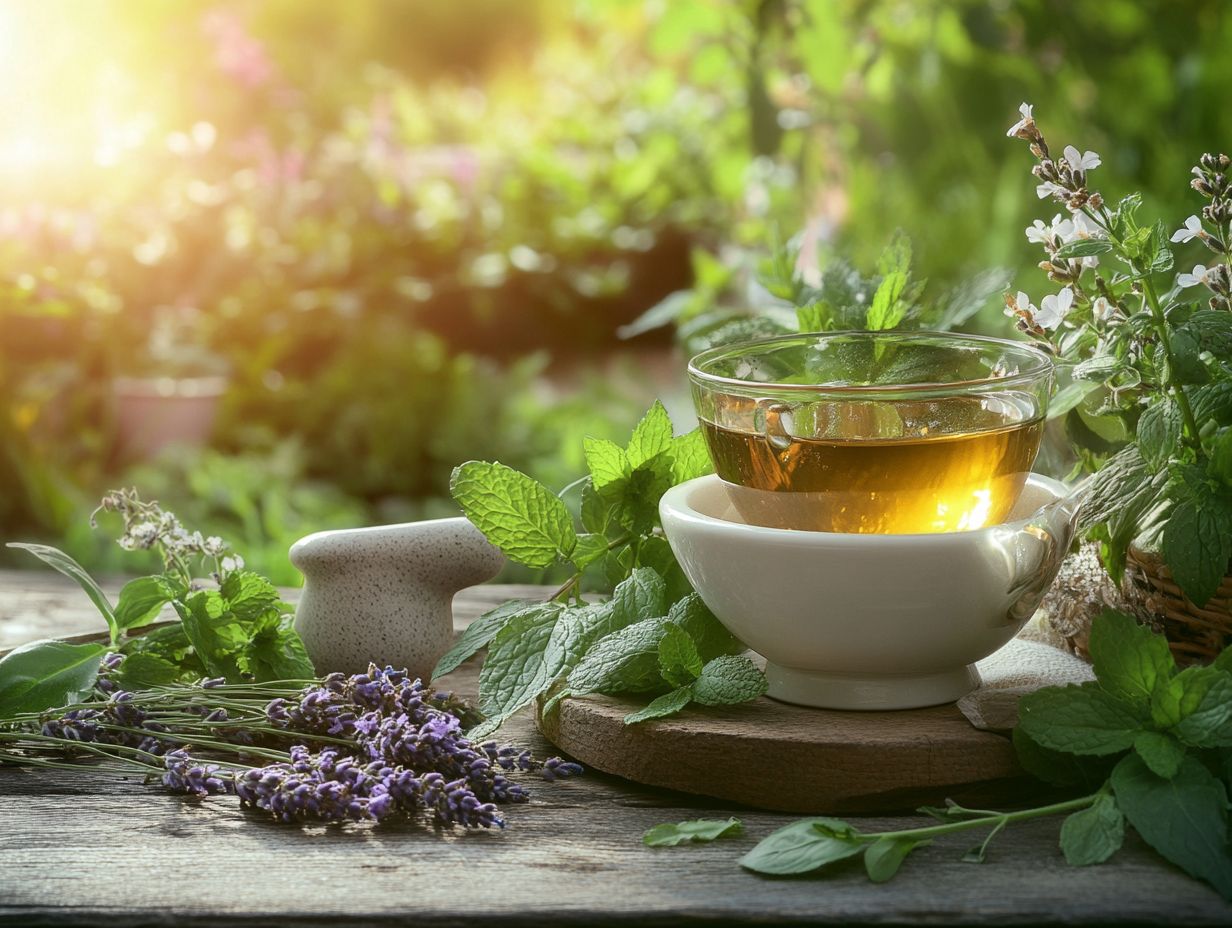
Effective combinations for headache relief often include both herbal treatments and acupuncture. This approach leverages the strengths of each to provide complete headache treatment tailored to individual needs.
Practitioners skilled in integrative approaches recommend specific herb blends, such as peppermint and ginger. These can enhance blood circulation and reduce inflammation, working alongside acupuncture techniques that focus on energy points like LI4 and ST36.
By assessing individual symptom patterns, these experts create personalized treatment plans. These plans target both acute discomfort and underlying issues. This combination encourages relaxation and balances the body s energy, leading to more consistent and lasting relief from headaches.
Preventing Headaches with Herbs
Preventing headaches with herbs requires a proactive mindset prioritizing overall wellness. Embracing herbal remedies means enhancing emotional balance and promoting health.
This holistic approach can significantly reduce the frequency of migraines and other headaches, allowing you to navigate life with greater ease and comfort.
Herbal Strategies for Preventing Headaches
Herbal strategies for preventing headaches involve developing a regimen that includes herbal supplements known for their calming effects and potential to improve blood flow.
Integrating herbs like feverfew and butterbur can significantly manage headache symptoms. Feverfew has traditionally reduced migraine frequency and intensity, while butterbur may alleviate tension headaches by promoting better circulation.
Incorporating essential oils like peppermint, which can be inhaled or applied topically, may provide immediate relief due to its soothing, cooling properties.
For a holistic approach, staying hydrated and including anti-inflammatory herbs like turmeric and ginger can bolster the body s defenses against chronic headaches.
These herbal strategies not only promote a headache-free lifestyle but also enhance overall health.
Frequently Asked Questions
What are natural remedies for headaches using herbs?
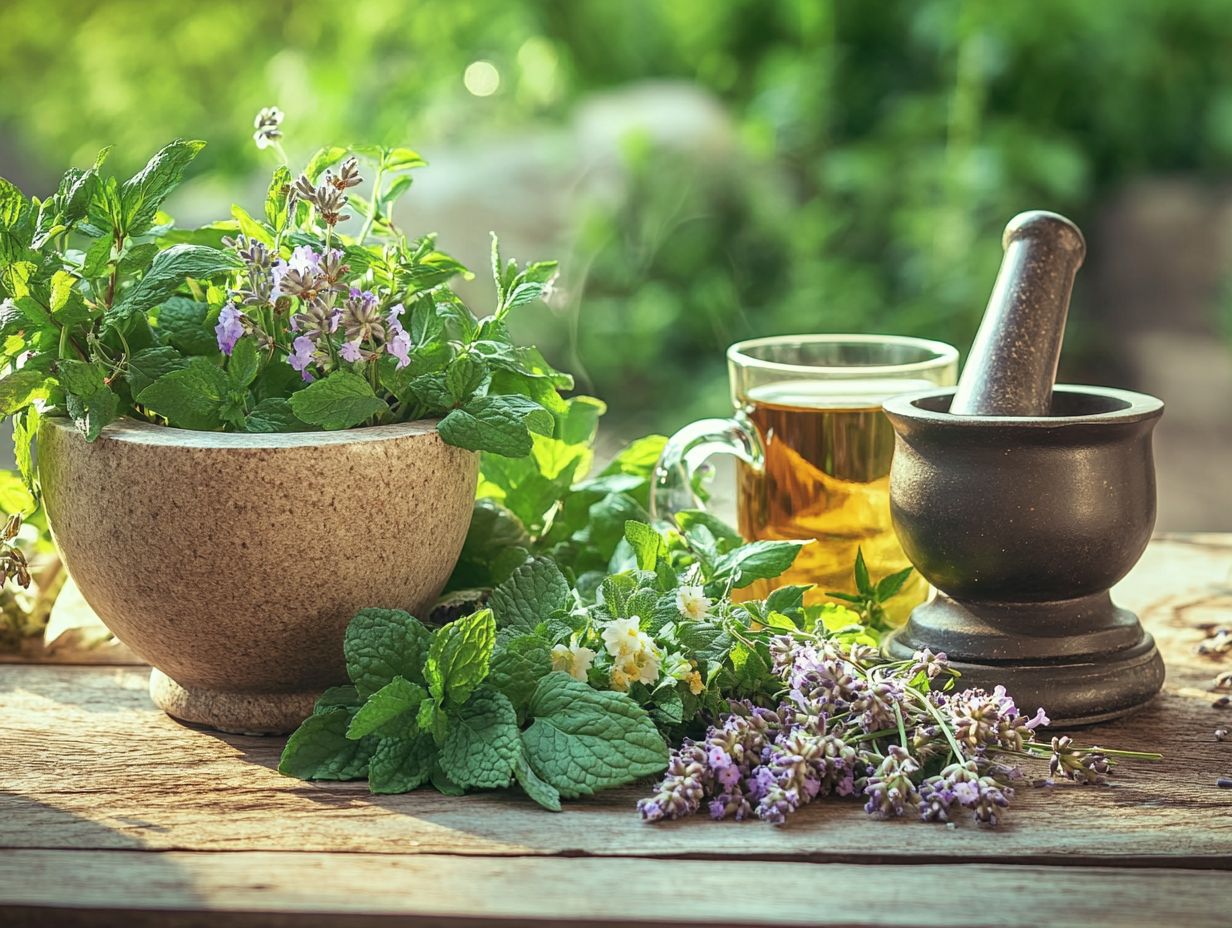
Natural remedies for headaches using herbs are alternative treatments that utilize medicinal plants and herbs to alleviate headaches without pharmaceutical drugs.
What are the benefits of using natural remedies for headaches?
There are several benefits to using natural remedies for headaches, including fewer side effects, cost-effectiveness, and potential for long-term relief.
Which herbs are commonly used for headache relief?
Some herbs that are commonly used for headache relief include peppermint, ginger, feverfew, and butterbur.
How do these herbs help with headaches?
These herbs contain compounds that have been shown to reduce inflammation, relax muscles, and alleviate pain, all of which can contribute to headache relief.
Are there any risks or side effects associated with using herbs for headaches?
While herbs are generally considered safe, it is important to consult with a healthcare professional before using them, as some may interact with medications or have potential side effects.
Can natural remedies for headaches using herbs be used alongside other treatments?
Yes, natural remedies for headaches, including traditional Chinese medicine, can be used alongside other treatments, but it is important to discuss this with a healthcare professional to ensure they do not interact negatively.


